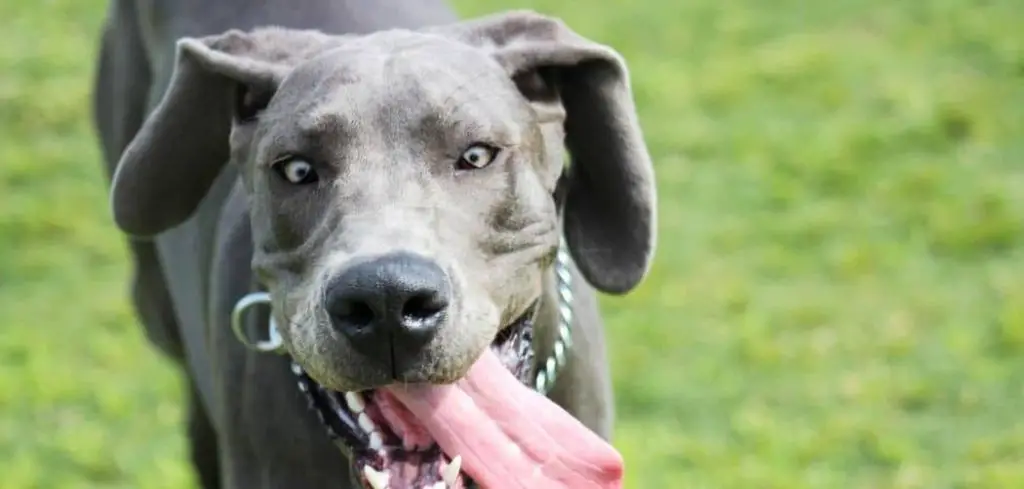If your dog is howling and not eating, it can be alarming and confusing. These two symptoms often point to physical discomfort, emotional distress, or serious underlying illness.
We outline the common causes of dog howling and not eating, what you can do at home, and when to seek veterinary help.
Dog Howling and Not Eating — Why It Happens
When your dog is howling and refusing food, it’s often a signal of pain, anxiety, or a systemic health issue. Conditions such as injury, digestive trouble, cognitive dysfunction, or emotional stress can cause both behaviors.
Howling may express pain or confusion, while loss of appetite suggests something is interfering with their normal functioning.
It’s important to assess their environment, behavior, and any other symptoms to narrow down the cause.

Common Causes of Dog Howling and Not Eating
Pain or Injury
Pain is one of the most common reasons a dog may howl and refuse food.
Dogs might howl due to musculoskeletal injuries, dental pain, or internal discomfort. If eating becomes painful or movement is limited, they may avoid food altogether.
Signs to watch for include limping, trembling, flinching when touched, or changes in posture. If the howling seems especially intense or occurs when they move or try to eat, pain is likely involved.
Canine Cognitive Dysfunction (Dog Dementia)
Senior dogs who howl at odd hours and lose interest in food may be developing cognitive dysfunction.
This condition causes disorientation, anxiety, and changes in sleep and appetite patterns. Dogs may howl out of confusion or distress and stop eating because they forget mealtimes or feel unsettled.
You may also notice pacing, staring at walls, or accidents in the house.
Read more: Dog Acting Weird and Not Eating (What’s going on?)
Gastrointestinal Upset
Nausea, bloating, or discomfort in the stomach or intestines can make your dog howl and stop eating.
They may feel sick, gassy, or crampy—resulting in vocalizations and loss of appetite. Vomiting, diarrhea, licking the lips, or eating grass may also occur.
This could result from diet changes, toxins, pancreatitis, or blockages.
Separation Anxiety or Stress
Emotional triggers like separation anxiety or environmental changes can cause both howling and food refusal.
Dogs left alone for long periods may howl due to stress and avoid eating until their person returns. Major life changes—like moving, boarding, or new pets—can also cause emotional shutdown.
Stress-related symptoms may include pacing, drooling, or destructive behavior.
Read more: Dog Groaning and Not Eating (What those low sounds might mean)
Neurological Conditions
Disorders affecting the brain—such as seizures, brain tumors, or meningitis—can lead to howling and appetite loss.
These issues may cause confusion, vocalization, and disinterest in food due to discomfort or altered mental state.
Neurological signs might include stumbling, twitching, or staring off.
What to Do If Your Dog Is Howling and Not Eating
If your dog is howling and not eating, first try to calmly observe their behavior without overwhelming them.
Check for signs of injury, bloating, or other distress. Offer bland food like boiled chicken and rice, and see if they respond. Reduce stressors in the home—minimize noise, avoid major changes, and stick to routine.
Make sure they have a quiet, safe space to rest. Monitor their hydration and keep a log of symptoms, including when they eat, drink, or howl. Avoid punishment—howling may be your dog’s way of expressing discomfort or distress.
If the behavior persists for more than 24 hours or worsens, contact your vet.
When to Call or Visit Your Vet
Seek veterinary help if:
Your dog hasn’t eaten in more than 24 hours
They are howling continuously or appear to be in pain
Vomiting, diarrhea, or bloating is present
There are signs of confusion or neurological changes
You notice injury, swelling, or abnormal posture
These symptoms may indicate a serious medical condition that needs immediate attention. Trust your instincts—if your dog seems unwell, a vet evaluation is always the safest step.
Read more: Why is my dog isolating himself and not eating (Why your dog might withdraw suddenly)
Key Takeaway
Howling and not eating in dogs often signals that something isn’t right—whether it’s physical pain, digestive upset, or emotional stress.
Pay close attention to their behavior, comfort them, and consult your veterinarian if symptoms persist or escalate. Your dog may be trying to tell you they need help, and timely intervention can make all the difference.
